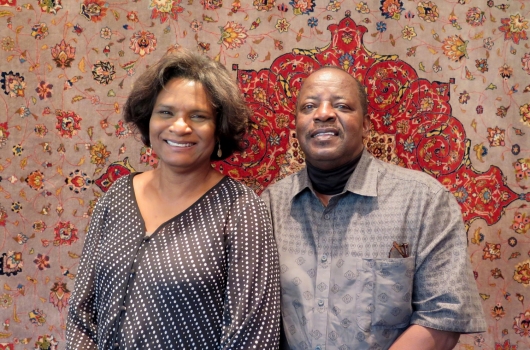There is a Balm in Gilead
 NBA Incubate SENT Seminar Participant Joanne and Virgil Flowers
NBA Incubate SENT Seminar Participant Joanne and Virgil Flowers
In September 2017, the NBA Incubate Initiative hosted the 2017 SENT Seminar: Equipping Social ENTrepreneurs for Leadership and Change, in Leavenworth, Kansas. Designed for Disciples and their leadership teams who are starting new health and social services ministries, the SENT Seminar covers the basics of nonprofit ministry startups, as well as skills for leadership and change in our global and faith communities. Joanne Flowers, Flowers Ministries, attended as a 2017 SENT Seminar Participant and shares this reflection.
Public health has been my passion since I first discovered it as a member of the WAC (Women’s Army Corps), almost forty years ago. Since that time, I have worked in public health in the military, as well as in state and local governments. I am convinced that Ralph Waldo Emerson stated accurately, “the first wealth is health.”
I was called into ministry about 15 years ago. I was working as a public health college professor, and needless to say, this was quite unexpected. I was very unsure of what the future would hold in ministry and I certainly did not know how I could the church. Nevertheless, I enrolled in seminary and I served on several short-term mission trips and little by little, I began to understand what God was calling me to do.
At a research symposium held at Duke University’s Center for Spirituality, Theology, and Health, my vision became a little clearer. Attendees reviewed and discussed a wealth of research studies which examined the relationship between Christian spirituality and health and wellness, such as the role of prayer and healing. In one study, religiosity was found to be an important predictor of positive health outcomes. In another, religiosity was important for not only the well-being of the patient, but the caregiver as well. Others found the church to be an important source of social capital for healthy living. While these findings are probably not a surprise for most Christians, they welded immeasurable power in changing the attitudes of many in the health professional about the role of religion in health. Though research establishing the role of faith and health is ongoing, it occurred to me, does the church have a role in health and wellness? Sure, many churches have health fairs or lectures, but many churches do not. Some churches have health ministries consisting of parish nurses or similarly trained health care professionals. Unfortunately, others do not, and they are usually those serving communities who may benefit the most.
In the United States, health care is not available to everyone. When there are limited funds to pay for health services, an emphasis is placed on diagnosis and treatment, with minimal time and money placed on educating the patient. Moreover, with a large proportion of our population that is aging, the church should prepare itself to provide supplemental support services whenever possible.
Is there no balm in Gilead? Is there no physician here?
Jeremiah 8:22
The words of an African American spiritual answers this question.
There is a balm in Gilead to make the wounded whole.
“Flowers Ministries” has evolved from a vision to be, for as many as possible, that balm in Gilead. We are dedicated to (1) disseminating health information; (2) eliminating health disparities whenever possible through health education and health promotion; and (3) encouraging healthy lifestyles. We have, and plan to continue to make, presentations in churches, at conferences, or workshops, as requested. We also plan to develop curricula for an even wider distribution of information.
Teaching in kindness and love, this ministry will empower people with knowledge so they can make informed decisions about their health. This is the manner in which I hope to serve others and serve God.
Printer friendly version here! >>
The NBA incubates new ministries, supporting social entrepreneurs of faith who are serving their communities in a variety of innovative ways and empowering these Disciples-led health and social service projects to focus on growth, impact, and sustainability. Learn more at nbacares.org/incubate or by contacting Rev. Ayanna Johnson Watkins, Director of the NBA Incubate Initiative, at awatkins@nbacares.org.